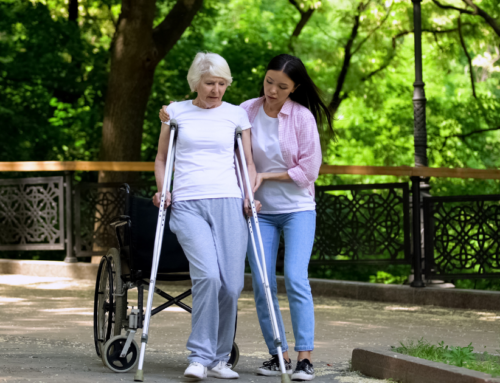How to Identify and Deal With Lewy Body Dementia—Part 3
Disclaimer: The following is for informational purposes only. New Wave Home Care does not recommend, encourage, or discourage the use of any medication or treatments. For diagnosis and treatment of Lewy body dementia, seek the aid of a qualified medical professional.
In part 2 we discussed medication and treatment of Lewy body dementia. Now lets talk about being a care-giver to a loved one afflicted LBD.
How to care for both patient and caregiver
In the course of giving care, you will experience a gamut of negative emotions. Please recognize that these emotions are normal responses to unpleasant and unhappy stimuli, and punishing yourself for having them does not serve you or the family member with LBD well.
While there may be some nobility in Spartan stoicism, there comes a time when the helper will need help. Whether it’s a matter of trusting others with your loved one, or financial concerns, it’s essential to recognize that quality help is available to you. However, until you reach that point, there is much you can do in the meantime.
Lifestyle and home remedies
Caregivers can help an LBD sufferer by regulating and optimizing the environment. You can make it easier for someone with dementia to function by reducing clutter and eliminating distractions from noise and other sources. Keep tasks simple by breaking them into “bite-size chunks.” Establishing daily routines and structure can also be less confusing.
A caregiver’s responses, if not measured and controlled can worsen the LDB sufferer’s behavior. Don’t call out failures, instead reinforce successes. A calm, reassuring voice will go a long way to defusing potentially volatile situations. Keep in mind that you’re not going to fix or “rewire” the patient’s brain. Do not correct or quiz a person with dementia. It only makes things worse for both involved. Offer reassurance and validation of the LBD sufferer’s concerns.
Symptoms and progression are different for everyone with Lewy body dementia. There are no off-the-rack solutions. As a caregiver, you may need to adapt the following tips to individual situations:
- Speak clearly and simply. Maintain eye contact and speak slowly and in simple sentences. Don’t rush the response. Present only one idea or instruction at a time. Use gestures and cues, such as pointing to objects.
- Encourage exercise. Benefits of exercise include improvements in physical function, behavior, and depression symptoms. Some research shows exercise may slow cognitive decline in people with dementia. In the case of neurodegenerative diseases, researchers recommend exercises that direct affect coordination, balance, and control, such as Yoga and Tai Chi, combined with a healthy diet. (According to research, the healthiest diet is vegetarian with fish thrown in as an honorary vegetable.)
- Providing cerebral stimulation in the form of games, crossword puzzles, and other activities that involve reasoning skills may help slow mental decline in people with Lewy body dementia.
- Behavioral issues may worsen at night, which can be ameliorated by establishing certain nighttime routines. Create a calming bedtime environment by eliminating televisions blaring in the background, the clatter of dishes and pots during meal cleanup. Family members will need to keep a check on their level activity. All of the aforementioned can be distracting and disruptive. Leave nightlights on to prevent disorientation. Limiting caffeine during the day, discouraging daytime napping, and offering opportunities for daytime exercise may help prevent nighttime restlessness.
Coping and support
People with Lewy body dementia often experience a mixture of emotions, such as confusion, frustration, anger, fear, uncertainty, grief, and depression. Offer support by lending a sympathetic ear. Reassure them that they still can enjoy life. Remain positive and do your best to help the person maintain their dignity and self-respect.
If you’re a caregiver for someone with Lewy body dementia, watch the person closely to make sure he or she doesn’t fall, lose consciousness, or react negatively to medications. Provide reassurance during times of confusion, delusions, or hallucinations.
Caring for the Caregiver
The physical and emotional demands of caregiving can be exhausting, especially if you are advancing in years yourself. You may experience anger and guilt (for being angry when you’re not the one suffering, even though in a way you are—your normal life is gone and most likely will not be coming back), as well as frustration, discouragement, worry, grief, and social isolation. Many people with Lewy body dementia and their families can benefit from counseling or local support groups.
Help prevent caregiver burnout
Don’t be afraid to seek out assistance. Ask family members or friends for help when you need it. See where you needs lie, whether it’s help in the house, someone to run errands, carry groceries, drive, etc. Be sensitive to your own needs, especially if you are dealing with physical limitations. Solutions will be unique to your particular circumstance.
Things you can do:
- Set a schedule
- Set aside time for yourself
- Exercise regularly and eat a healthy diet
- Learn as much about the disease as you can.
- Join a support group.
- Consider in-home health services to help you care for the person with Lewy body dementia.
For more information and assistance, schedule a FREE consultation. Call 888-385-9898



